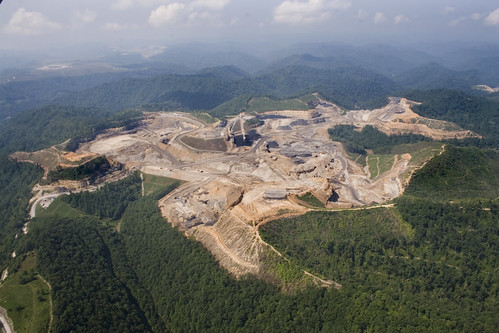EPA Vetoes Massive Mountaintop Removal Mine — Now Buckle Up for the Backlash
Cross posted from Grist and the Front Porch Blog. – – By Matt Wasson of Appalachian Voices
 In the wake of EPA’s veto last week of the largest mountaintop removal mine permit ever proposed in West Virginia, the grandstanding of West Virginia politicians and “sky is falling” rhetoric from the coal industry was not surprising. Every effort to protect streams and communities from the devastating impacts of mountaintop removal has been met with a similar chorus of complaint by coal companies and local politicians.
In the wake of EPA’s veto last week of the largest mountaintop removal mine permit ever proposed in West Virginia, the grandstanding of West Virginia politicians and “sky is falling” rhetoric from the coal industry was not surprising. Every effort to protect streams and communities from the devastating impacts of mountaintop removal has been met with a similar chorus of complaint by coal companies and local politicians.
However, the immediate response of coal industry groups and West Virginia politicians to the news of EPA’s action was a little different this time around. Notably absent was any reference to the so-called “War on Coal,” which had previously been a mainstay of the coal industry’s talking points. Instead, every West Virginia politician and coal industry trade group that issued a response to EPA’s action appeared to be reading from the same script – a new one focused on broad national implications of EPA’s action for all US industries, not just coal. Apparently we are now to believe that the opposition of West Virginia politicians to any and all regulations protecting streams from obliteration by coal companies is not about any provincial concerns or pressure from the most powerful industry in their district, but about “regulatory certainty,” national energy supply, national security and the unemployment rate.
The new narrative about overbearing federal regulators stifling the economy and threatening national security fits nicely with the ideological persuasions of many new members of Congress. They would seem to be the primary target of the coal industry’s new PR strategy, the goal of which is clearly to convince Congress to rein in the EPA and prevent the agency from promulgating new rules or enforcing existing ones. And the centerpiece of this new narrative is EPA’s veto of the Spruce permit, which, it is increasingly apparent, was part of the coal industry’s game plan all along.
That’s not to downplay the importance of EPA’s action or the courage shown by Lisa Jackson in following through on the veto in the face of intense industry opposition and the growing potential for Congressional backlash. Moreover, environmental and community advocates were rightly enthusiastic about EPA’s veto, as the alternative would have signaled a major retreat in EPA’s crack-down on mountaintop removal permitting. But EPA’s documents and public statements make clear that the agency was bending over backwards in an attempt to negotiate a settlement with the company and they stated specifically that it was the company’s unwillingness to contemplate any alternative mine plans that left the agency with no choice but to veto the permit. Amazingly, the agency even went so far as to hire its own mine engineering firm to develop an alternative mine plan that would have cut the stream impacts in half while producing the same amount of coal at about the same cost.
But Arch Coal didn’t want to negotiate with the EPA to reduce the impacts of the Spruce permit, despite the fact that Arch successfully negotiated a settlement with the EPA and won approval for their Pine Creek mountaintop removal mine permit just last summer. Spruce was different because it was the most controversial permitting action the agency has taken in regard to mountaintop removal, representing just the 13th time EPA has ever issued such a veto and one of the few times it has overturned a Clean Water Act permit that had been previously approved by the Army Corps of Engineers. It’s the type of action that makes the anti-regulatory teahadists in Congress apoplectic and, given the industry’s campaign to incite Congress to roll back the administration’s new guidances and rules on mountaintop removal mining, an EPA veto of the Spruce permit provided the perfect opportunity to broaden their coalition.
So Appalachian coal companies have successfully chosen their battlefield. Now they have to convince enough legislators – and their constituents – that EPA’s crackdown on mountaintop removal permits is of national importance and demands action from Congress. Given the lack of evidence for any of the arguments they are using to “nationalize” their fight with EPA, convincing members of Congress outside of Appalachia should still be a tall order. In order to do my part in making that order as tall as possible, I’ve prepared a quick summary of the arguments mountaintop removal supporters are using to nationalize their issue and a synopsis of why each of their talking points is deceptive.
The top priority of coal companies and their supporters in Congress is to portray EPA’s denial of some permits as a threat to the entire US coal industry and to all industries that rely on “Dredge and Fill” permits under Section 404 of the Clean Water Act.
When it released its draft guidance on Appalachian surface mining in April, 2010, EPA specifically made clear that its provisions on 404 permitting are “applicable only to those discharges associated with Appalachian surface mining operations.” That, however, didn’t stop the National Mining Association from issuing this statement immediately after EPA’s announcement of the Spruce veto:
“The implications could be staggering, reaching all areas of the U.S. economy including but not limited to the agriculture, home building, mining, transportation and energy sectors.
“If EPA is allowed to revoke this permit, every similarly valid … permit held by any entity — businesses, public works agencies and individual citizens — will be in increased regulatory limbo and potentially subject to the same unilateral, after-the-fact revocation.”
Sounds pretty scary until you learn that EPA also addressed the “regulatory limbo” issue directly in its response to public comments on the Spruce permit. Specifically, EPA stated:
“… the Spruce No. 1 Mine represents a unique set of circumstances. As is clear from the summary in the Final Determination, the project has a long history of controversy, including multiple lawsuits. During the course of that controversy, EPA frequently voiced concerns… EPA recognizes that instances where the need to act occurs after a permit has issued are legal, but should be rare.”
Ken Ward at the Charleston Gazette paraphrased a final piece of the industry’s “regulatory over-reach” argument as going something like:
“The Spruce Mine got every approval needed every step of the way, cleared every regulatory hurdle required, and was ready to go — but for the meddling of those anti-coal lefties from the Obama administration.”
Then, in the remainder of his must-read piece on the Coal Tattoo blog, Ken goes on to eviscerate the argument. Ken concludes that, “When politicians say the Spruce Mine has crossed every hurdle, they’re just wrong.”
Other than these new additions to the “regulatory over-reach” argument, the rest of the talking points supporting the coal industry’s new narrative will sound familiar to anyone who knows the coal industry or West Virginia politics. In a nutshell, the argument is that forcing coal companies to stop destroying streams will cost jobs, threaten national security, and may very well cause us all to freeze in the dark without electricity. These arguments all share one fatal flaw, however: they are belied by the fact that the amount of coal production in the US is not limited by the ability of mining companies to obtain permits, but by the low (and decreasing) demand for coal.
According to the Energy Information Administration, the US coal mining industry was operating at an anemic 75% of its production capacity in 2009, down from 85% in 2008. That low capacity utilization is the result of a huge drop in demand for coal as well as competition from a burgeoning supply of natural gas. To put the current controversy in perspective, the 2.7 million tons of coal that the Spruce mine would have produced annually represents less than 1% of the unused production capacity at already-permitted US mines. Moreover, the EIA’s recently released 2011 Annual Energy Outlook projects that coal demand will not return to 2008 levels for the next 15 years. In the mean time, there are plenty of other mining companies that would be happy to take up any available market share, which helps explain why the Spruce backlash is only coming from West Virginia politicians and not from western or midwestern coal state legislators.
Below is a summary of EIA’s data on coal mine capacity utilization, and here is a link to the actual data:
Even if a government agency or Congress went so far as to shut down every single surface coal mine in Central Appalachia, the average capacity utilization of existing US mines would only need to increase from 75% to 82% to replace that lost production. Thus, the argument that EPA restrictions on mountaintop removal permits threaten our energy supply and national security has no basis in fact whatsoever. As in, like, none.
Similarly, EPA’s stricter enforcement of laws impacting mountaintop removal mining would have no impact on the national unemployment rate even if the agency really was out to destroy jobs and the economy, as those in the coal industry frequently contend. Because there is insufficient demand for all of the coal that US companies could produce, jobs created to mine coal in one location come at the expense of jobs that would have been created or retained at other mines. It’s not like permitting a mine suddenly creates new demand for the coal it will produce.
Despite what must be heroic efforts of West Virginia politicians to deliver these new arguments with a straight face, it’s local politics, not national security, that is driving their actions. Unfortunately for West Virginians, this focus on false controversies comes at the expense of addressing the very real need to diversify the economy of Central Appalachia. That need has little if anything to do with the EPA, but is primarily the result of an irreversible decline in Central Appalachian coal reserves. As Arch Coal’s CEO Steve Leer explained to a group of utility executives at a conference last September:
“We see [Powder River Basin coal] flowing in to replace the decline in Central Appachia. That decline is inevitable – we can debate the speed of it, the shape of the curve, but the last decade would tell you that decline is inevitable… The permitting issues and the regulatory issues simply accelerate that, but its driven by the reserves.”
It’s also important to point out that mountaintop removal employs fewer miners than traditional mining techniques and is favored by mining companies specifically because it saves money by replacing miners with machines. As a result, if coal production at a new mountaintop removal mine displaces production at a nearby underground mine, as it almost certainly would given the low demand for coal (undergound mines in Central Appalachia are operating at just 68% of their capacity), the number of jobs in the local area will actually decrease. In fact, that is exactly what has been happening in Appalachia in recent decades as coal mining has shifted from traditional underground mining techniques to the ruthlessly efficient process of mountaintop removal.
Despite a mountain of evidence that mountaintop removal is destroying the economy, environment and communities of Appalachia, the agenda of West Virginia’s politicians continues to be driven by local politics, which is dominated by the coal industry. Right now, preventing EPA from enforcing regulations on mountaintop removal is at the top of their agenda, but they’ll need to convince a whole lot of members of Congress to join their cause in order to be successful.
A roll-back to Bush-era regulations (or lack thereof) on mountaintop removal is a very real risk and preventing it can only happen if people across the country contact their representatives and make their voices heard. West Virginia has a powerful Congressional delegation, but it’s not as influential as constituents, when it comes to the majority of legislators that are not beholden to the coal industry. That’s where you come in. If you haven’t joined the movement to stop mountaintop removal, now is the time you’re needed most. Please sign up on iLoveMountains.org and make your voice heard.














